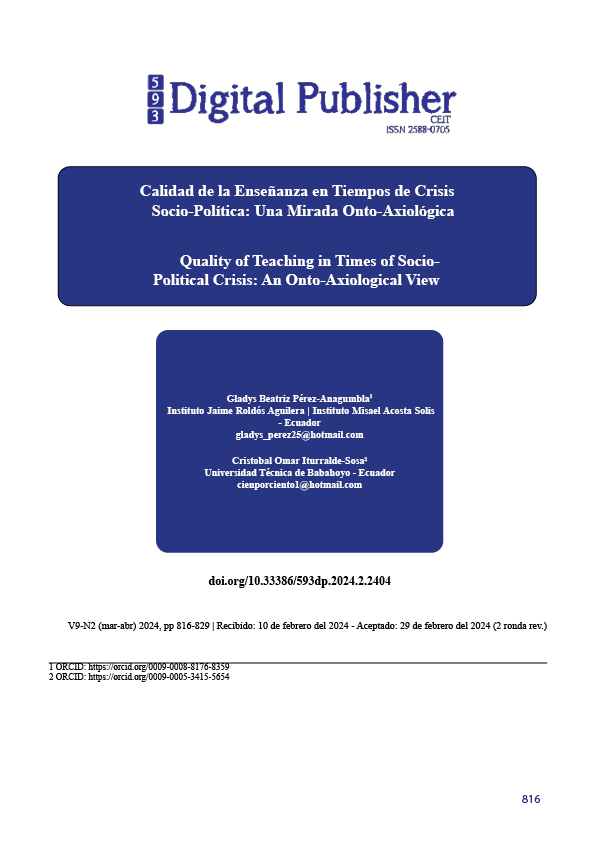Quality of Teaching in Times of Socio-Political Crisis: An Onto-Axiological View
Main Article Content
Abstract
Training is a multi-referential system, where the cognitive subject develops its cognitive potential, associated with its subsequent reality, here its empirical consistency gives sense and meaning to school learning, achieving a strengthened imbrication in the ontoepistemic contrast, because knowledge must transcend the classroom and be located in the situational; therefore, the pedagogical node has to be secular, where its exploits are in line with the epochal virtue, overcoming the historical, cultural and proper niches of the socio-political moment, only in this way, education will be of great benefit in the extrapolative principles; hence, it is proposed as a general objective, to analyze the quality of teaching in times of socio-political crisis: an onto-axiological look at the basic general education in Ecuador.
Downloads
Article Details

This work is licensed under a Creative Commons Attribution-NonCommercial-ShareAlike 4.0 International License.
1. Derechos de autor
Las obras que se publican en 593 Digital Publisher CEIT están sujetas a los siguientes términos:
1.1. 593 Digital Publisher CEIT, conserva los derechos patrimoniales (copyright) de las obras publicadas, favorece y permite la reutilización de las mismas bajo la licencia Licencia Creative Commons 4.0 de Reconocimiento-NoComercial-CompartirIgual 4.0, por lo cual se pueden copiar, usar, difundir, transmitir y exponer públicamente, siempre que:
1.1.a. Se cite la autoría y fuente original de su publicación (revista, editorial, URL).
1.1.b. No se usen para fines comerciales u onerosos.
1.1.c. Se mencione la existencia y especificaciones de esta licencia de uso.
References
Casanova, M. (2012). El diseño curricular como factor de calidad educativa. REICE: Revista Iberoamericana Sobre Calidad, Eficacia y Cambio en Educación, 10 (4), 6-20.
Crespo, L. (2009). La praxis educativa: una aproximación a la realidad en el aula. España: Mc Graw Hill.
Delors, J. (1996). La educación encierra un tesoro. Informe a la UNESCO de la Comisión Internacional sobre la educación para el siglo XXI. Madrid, España: Santillana.
Escarbajal, M. (2014). La educación intercultural en los centros educativos. España: REIFOP.
Ley Orgánica de Educación Intercultural de Ecuador. (2011). Registro Oficial No. 417 de 31 de marzo de 2011.
Loubet, R. y Morales, A. (2015). Formación del capital humano para el crecimiento económico en Ecuador. Ra Ximhai, 11 (3), 41-55.
Morín, E. (1999). La ética del género humano. Francia: ITAM.
OCDE. (2010). Acuerdo de cooperación México-OCDE para mejorar la calidad de la educación de las escuelas mexicanas. México: OCDE.
Pérez, E. (2002). Educar en el tercer milenio. Caracas: San Pablo.
Ribero, M. (2024). Hermeneusis cultural en la formación del estudiante universitario: un constructo epistémico desde la valoración intersubjetiva. Tesis Doctoral, Universidad de Carabobo. Venezuela.
UNESCO. (2007). La educación en el tercer milenio. Convención de Ginebra.
UNESCO. (2015). Incheon Declaration. Education 2030: Towards inclusive and equitable quality education and lifelong learning for all. Recovered from https://unesdoc.unesco.org/ark:/48223/pf0000233813.
World Bank. (2011). Learning for all: investing in people´s knowledge and skills to promote development. Education strategy 2020. Washington, DC: World Bank.



